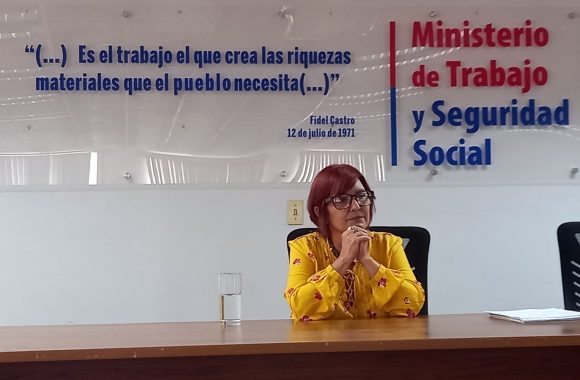
Havana, Apr 29th. - The Ministry of Labour and Social Security (MTSS) announced on Monday in Havana progress in improving the policy for the care of people with wandering behavior, as well as community social services that will enter into force in the coming days.
As Belkis Delgado Cáceres, director of Prevention, Assistance and Social Work at MTSS, explained to the press, the new regulations, which are published in the Official Gazette, will have a significant impact on the entire Cuban society.
Today, four important regulations of the Ministry of Labour and Social Security have been published in the Gazette. One of them establishes the procedure for the care of people with wandering behavior, improving the existing process. The other three standards relate to care services for vulnerable groups. These services include: teleassistance, home social assistance, and support for families caring for persons with severe disabilities. These efforts will have a positive impact on people with disabilities, older adults living alone and their families, the directive said.
She added that the measures are part of the National System for the Comprehensive Care of Life, a system that incorporates a gender approach, aligned with the rights of women and mothers. Although these services are not new, as they have existed since 2003, they are now expanded, improved and made more accessible.
He noted that people interested in acquiring more information can go to local workplace directorates, seek support from social workers in the communities or contact the ministry by telephone and other channels established for the exchange with the population.
Specifically, Agreement 10056/2025 states that wandering behavior is a disorder of multicausal human behavior that constitutes a way of life characterized by instability and insecurity in the home, lack of self-care and economic autonomy, care or family protection, as well as a favourable life project, or a combination of these factors. Usually, it is evidenced by transgression of the norms of coexistence and social discipline.
As a novelty of Agreement 10056/2025, Delgado Cáceres pointed out that wandering behavior and acting with those who, without being associated with an intellectual or mental disability, are conceptualized, refuse prophylactic work.
She added that the agreement defines and updates the responsibilities of the Governor, the Board of Directors, the Mayor, the multidisciplinary groups, as well as the entities that participate or assist in this process and their functions.
Delgado Cáceres also explained that the Social Protection Centre is defined as a social institution, its functions and the maximum stay time of the people who take these centres - insisting that these centres - they aim to contribute to the rehabilitation and social reintegration of people with wandering behaviour.
She added that this rule establishes the protocol of action for the arrest, information and transfer of persons with wandering conduct, which incorporates the preventive component and popular participation and control, complemented by a specific protocol of action when minors are detected in this situation.
The MTSS directive explained at the press conference that the CM 10057/2025 Agreement regulates the home social assistance service. It is a service for persons who, for reasons arising from age, illness or disability, are dependent to carry out personal, social and domestic life activities, and do not have family members in a position to provide support.
Delgado Cáceres added: This service is offered in the person's home, enabling it to remain in its usual environment, to meet its main biological, psychological, communicative and social needs, and to have access to community services.
She commented that, as a novelty, this agreement recognizes care as a work, in accordance with the principles of the National System for the Integral Care of Life, and establishes the circumstances to evaluate the granting of the service on an exceptional basis.
She added that responsibilities are established for the Directorates of Labour and Social Security, the Directorate-General for Health, the Insurance and Support Unit and home social workers.
Is the financing of this service also established as one of the uses of the social responsibility fund of voluntary reserves created by economic entities. Provision is made for the prior and certification of social workers, and the shared payment of the service between the family (50 per cent) and the State budget (50 per cent) is authorized.
On the other hand, Agreement 10068/2025 defines the telecare service as a way of maximizing the autonomy and well-being of persons who, for reasons arising from age, illness or disability, are dependent.
The objective is continuous monitoring and response to possible risk situations for dependent people and their caregivers, the MTSS directive said.
She added: "The people who care for this service are elderly or vulnerable people living alone permanently or for a large part of the day, or who, even if they live with others, these have similar characteristics of age, illness or disability.
Delgado Cáceres detailed that, in the case of this service, a pilot test will be carried out in several municipalities of five provinces (Havana, Artemisa, Mayabeque, Santa Clara and Santiago de Cuba), and that, after evaluating the results, the service will be extended to other territories of the country.
Finally, it reported some developments in Decree 121/2025 on care services for families with children with severe disabilities. The decree recognizes care as a job, updates the service and expands the subjects of law in accordance with the Families Code. In addition, it defines the requirements of access and establishes the responsibilities of the different bodies involved in the process, she said.
With the implementation of Decree Law 109, published in 2024 by the Official Gazette of the Republic, the country seeks to consolidate a National System for the Comprehensive Care of Life on the basis of guaranteeing the right of persons to receive care and the social recognition of those who assume these responsibilities. (Text and Photo: Cubadebate)